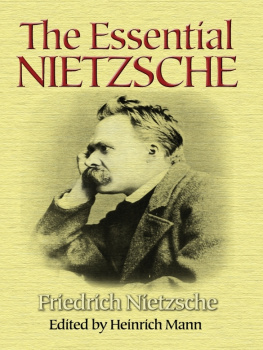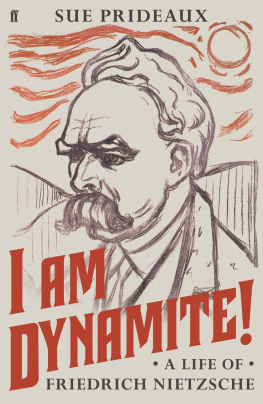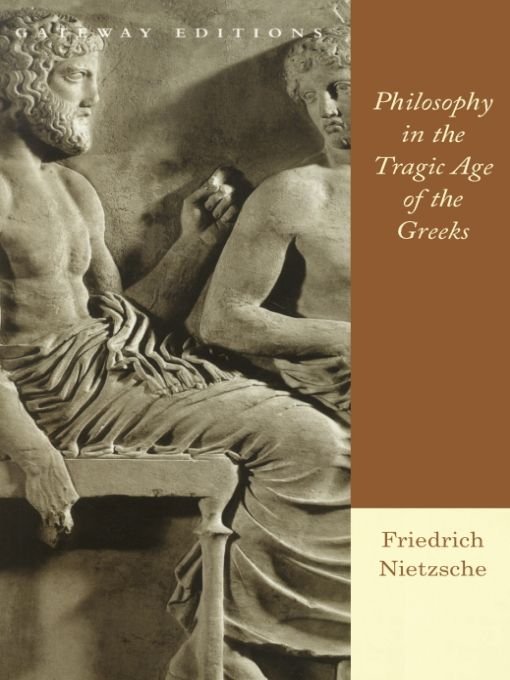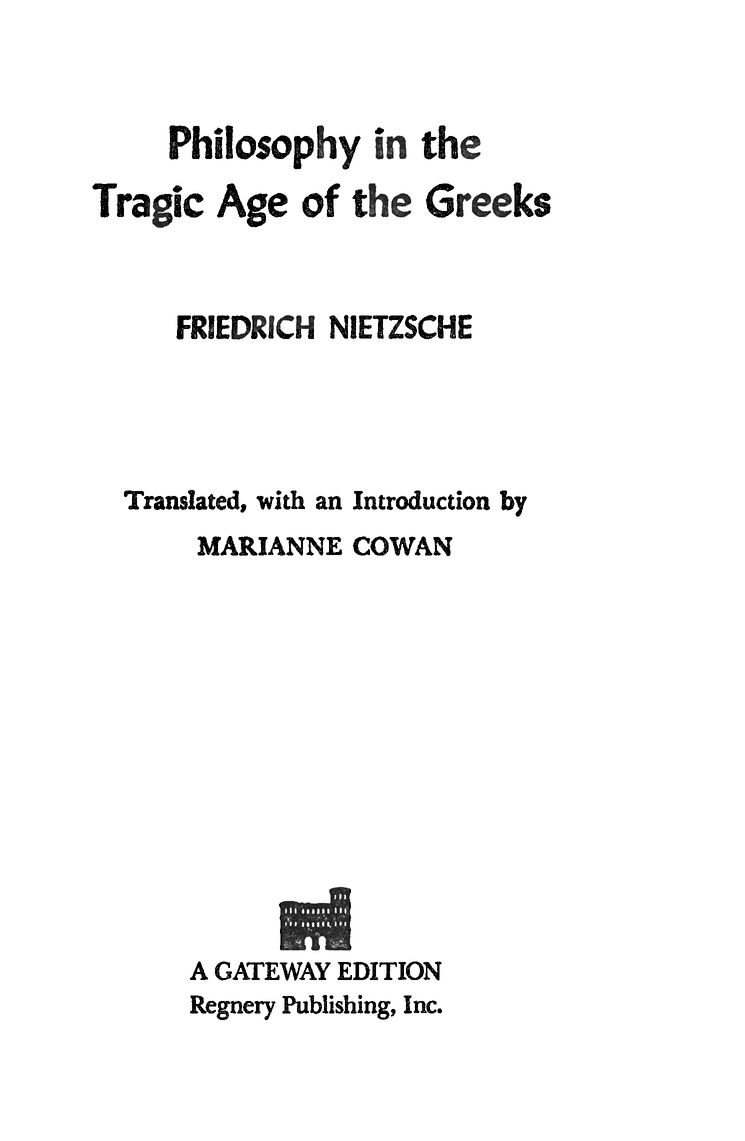Table of Contents
INTRODUCTION
I
The sixth and fifth centuries in Greece were a proving ground as well as a primal ground for Nietzsches philosophy. Like so many thinkers before him, and a few since, Nietzsche saw in this period an incomparable golden age in which the human spirit flowered in an abundance greater than men have since known. Further, he was of the opinion that even during this, their best period, the Greeks fell short of complete fulfillment of their self-evident potentialities. Nonetheless they achieved a more magnificent culture, if also a more spectacular and thought-provoking failure, than any other culture available for our observation. So Nietzsche believed, and he also believed that they would continue to merit the contemplation and study of untold generations. The Greeks have surely never been overvalued, he wrote early in life, and from that estimate he never wavered.
Nietzsches judgment of the Greeks rested in part, naturally, on a long European tradition, and on good rational historical interpretation of his time.
So much depends on the development of Greek culture because our entire occidental world has received its initial stimuli from it. An adverse fate decreed that the late and decadent forms of Hellenism should exert the greatest historical force. On their account, earlier Hellenism has always been misjudged. One must know the younger Greece in great detail in order to differentiate it from the older. There are very many possibilities which have not yet been discovered because the Greeks did not discover them. And others have discovered the Greeks and later covered them up again.
This fragment from one of Nietzsches early notebooks shows that he, in considering the Greeks, was by no means devoid of a sense of historical balance, not even during his most worshipful period. Nonetheless, much more than historical judgment is involved in his concern with them. He seems to have had an intuitive certainty, resting on a numinous, incontrovertible source in his own being, that the Greeks had achieved the highest type of culture that the world had seen. Indescribable riches were lost to us, as well as the archetypes of philosophical thought, as he calls the pre-Socratic philosophers. But, dearest of all, they are the collective representatives of the eternal intuitive type, the discoverers of the beautiful possibilities of life.
It is his instinctive reliance upon his own unconscious bases, plus the frequent intuitive emergence into self-recognition, that lends to Nietzsches utterances, here as elsewhere, such an iridescent, if not maddening twilight of contradictoriness. We feel anything and nothing may be seen by its glow, and as we are lured by it into one blind alley after another, our affectivities begin to explode. During the same period in which the foregoing quotations were written Nietzsche exclaimed: How can one possibly glorify and laud a whole people! Disturbed, we give vent to our irritation in line with our own seemingly rational temperament. Some close the book altogether, others delete from conscious memory one of the apparently contradictory viewpoints of Nietzsche (often arguing the more heatedly in favor of the one retained); still others enjoy with unholy glee the apparently irresponsible behavior of the mad philosopher.
The Nietzschean incongruities, however, are the peculiar pitfall of the Nietzsche devotee and may scarcely be felt by the less interested reader who knows Nietzsche, largely by reputation, as the great iconoclast among philosophers. Such a reader may well wonder that the breaker of old tablets, and transvaluor of all values, should have acquiesced so peacefully in the century-old traditional values ascribed to the ancients, as is evidenced by the little essay entitled Philosophie im tragischen Zeitalter der Griechen. And such wonder is quite justified, even beyond the immediately apparent. For although Nietzsches treatment of the Greeks seems to us today to fit into an unbroken, if gradually extended, tradition, this was by no means the opinion of his contemporaries. Had this essay been published, it might well have had for its audience an effect as electrifying as Die Geburt der Tragdie aus dem Geiste der Musik, which Nietzsche published in 1872. The Birth of Tragedy presented a view of the Greeks so alien to the spirit of the time and to the ideals of its scholarship that it blighted Nietzsches entire academic career. It provoked pamphlets and counter-pamphlets attacking him on the grounds of common sense, scholarship and sanity. For a time Nietzsche, then professor of classical philology at the University of Basle, had no students in his field. His lectures were sabotaged by German philosophy professors who advised their students not to show up for Nietzsches courses.
Philosophy in the Tragic Age of the Greeks came from the same period of Nietzsches thinking. It is necessary to know that the work as it is here published was never completed. It occupies a place in the posthumously published voluminous notes and fragments. Nevertheless it is different from the bulk of these notes in that Nietzsche had a clean copy of it made, within a year or two of its writing, and refers to it as the manuscript of a new whole book, albeit one far from completion. Various plans for completion are also extant, none comprising more than a paragraph or two, as well as jottings consisting mainly of the names of the pre-Socratic philosophers followed by various key-words of characterization. In addition, serious study of the essay in question demands some acquaintance with Nietzsches concurrent plans for other (also not completed) books on related topics, notes and fragments of which add up, at present, to several hundred printed pages. Taking all this into consideration and leaving out, for the moment, the matters covered in the published Birth of Tragedy, one may safely hazard some general suggestions about the fundamental objectives which Nietzsche hoped to advance through the essay here translated.
Nietzsches most deeply felt task at this time was undoubtedly one of education. He wanted to present the culture of the Greeks as a paradigm to his young German contemporaries who might thus be persuaded to work toward a state of culture of their own; a state which Nietzsche found sorely missing.
To get past Hellenism by means of deeds: that would be our task. But to do that, we first have to know what it was! There is a certain kind of thoroughness which is but the excuse for inactivity. Think of what Goethe understood about antiquity: certainly not as much as any philologist, and yet quite enough to enable him to engage in fruitful struggle with it. One should not, in fact, know more about a thing than one can oneself digest creatively. Moreover the only means of truly understanding anything is ones attempt to do it. Let us try to live in the manner of the ancientsand we shall instantly come a hundred miles closer to them than with all our learnedness. Our philologists nowhere demonstrate that they somehow strive to vie with antiquity; that is why their antiquity is without any effect on the schools.
My aim is to generate open enmity between our contemporary culture and antiquity. Whoever wishes to serve the former must hate the latter.
To this end Nietzsche apparently tried to compose at least two books, one dealing primarily with philosophers; the other to concern philologists. The connection of the latter with his fundamental aim is easily seen. Philologists hold most intimately and immediately in their hands the legacy of Greece. On their work, pious or pioneering according to their individual temperament, depends the image of Greek culture in the minds of present and future generations. However, Nietzsches book about philologists was never written; plans for it are mingled with plans for the one on philosophers, and both are partly absorbed in various of his














